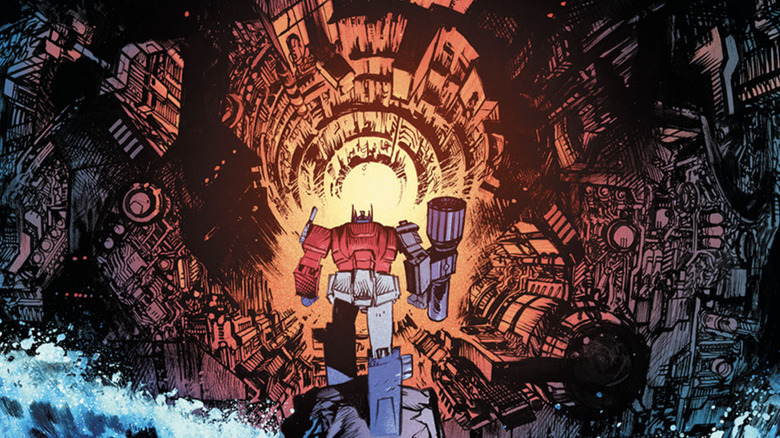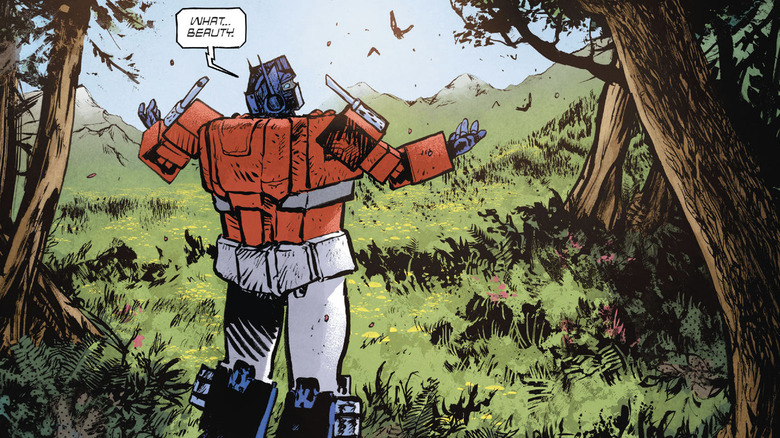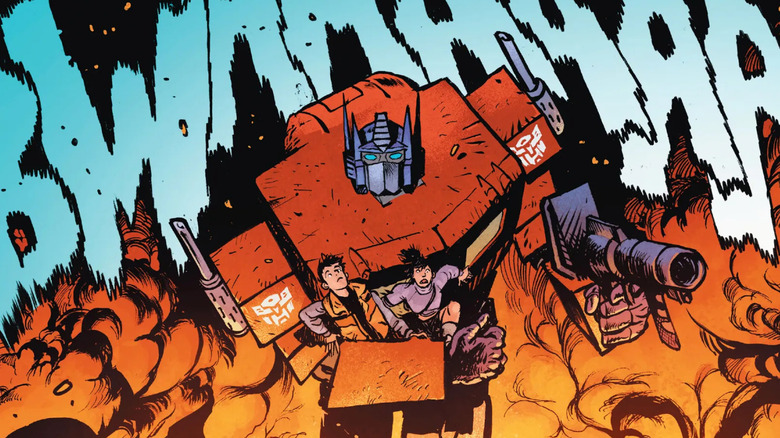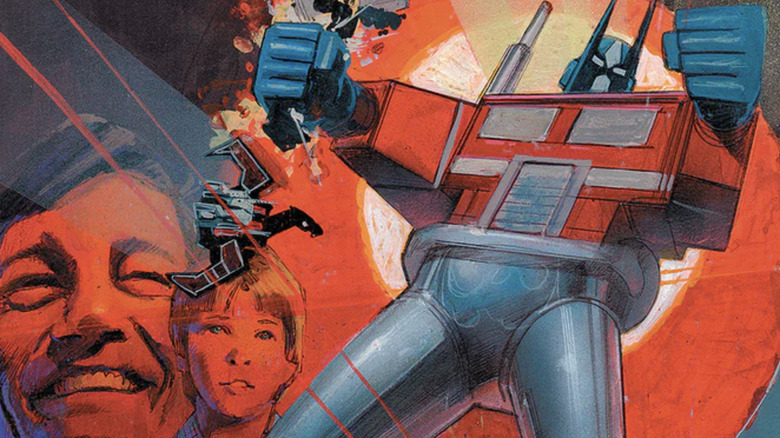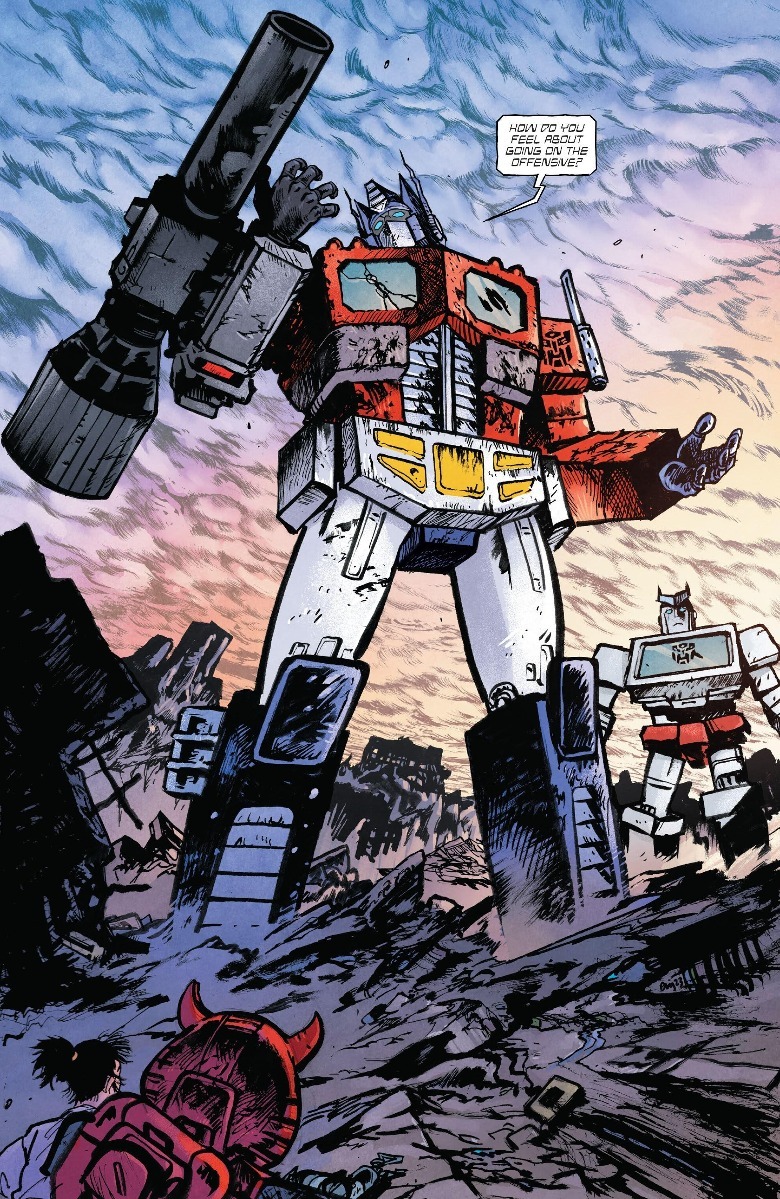One Perfect Sci-Fi Comic Series Is Outselling Nearly Every Marvel And DC Title
We may receive a commission on purchases made from links.
From 2005 to 2022, IDW Publishing held the "Transformers" comic license. When it was announced they were losing the license, fans felt uncertain; "Transformers" had been in IDW's hands for so long, so why not stay the course?
Change can be a great thing, though, and new "Transformers" publisher Skybound Entertainment is already making the most of the Robots in Disguise. (Skybound, founded by "The Walking Dead" and "Invincible" writer Robert Kirkman, is a partner of Image Comics.) Skybound's foremost publishing initiative is the "Energon Universe" — a setting combining "Transformers," "G.I. Joe," and Kirkman's original science-fiction title "Void Rivals." The ongoing "Transformers" comic written (and for the first six issues, drawn) by Daniel Warren Johnson kicked off this new universe and remains its crown jewel so far.
"Transformers" #1, published on October 4, 2023, was the best-selling comic issue of that year; it's currently gone to 10th printing. Since it began, "Transformers" has only fallen out of the top 10 best-selling comic series once (in September 2024, when "Transformers" #12 came in 11th place). This past month of October 2024, "Transformers" was back in the top 10 at spot no. 5. The only comics that sold more than "Transformers" in October 2024 were "Absolute Batman" #1, "Absolute Wonder Woman" #1, "Ultimate Spider-Man" #10, and "Uncanny X-Men" #4.
What does this suggest? For one, comic readers new and old like fresh starts. "Ultimate Marvel" and "Absolute DC" are both universe-wide reboots that reimagine the classic characters in a new setting without decades of convoluted continuity. The success of "Transformers," too, suggests that. As for "Uncanny X-Men" staying near the top, the X-Fandom is known for being very loyal (some might say insular).
Skybound's marketing gave "Transformers" wind in its sails. Take how the comic's main cast was slowly revealed one by one in June 2023, creating extra anticipation. The sales suggest that the initial excitement hasn't worn off; from April to July 2024, "Transformers" outsold every DC comic (and most of the Marvel ones too). The momentum has kept up and people are hooked on "Transformers," because the book is damn good.
Skybound's Transformers is the original cartoon all grown up
One reason why "Transformers" has sustained its success is Daniel Warren Johnson's unrelenting pacing. DWJ's style has been compared to manga, which tends to get less lost in wordiness than American comics; reading "Transformers" feels like a breathless battle shonen, where the story is told through action. Something happens in every issue of "Transformers," with not a page wasted. Even the chapters that have to be set up, like issue #2 and issue #8, still have a lot going on with the characters.
This pacing boosts the stakes. "Transformers" has always nominally been a war story. This comic has the narrative pendulum that a story like that needs: sometimes the Autobots are winning, sometimes the Decepticons are winning, and the comic keeps flipping this back and forth as the two sides each gain then lose advantages. Johnson is even getting infamous for killing characters, even sacred cows, but in a war comic, no one should feel safe.
Basically, "Transformers" operates like a monthly comic should. When a story comes with regular gaps, and you need to keep paying $3.99 apiece, each single issue has to be worth it on its own terms — not only as part of a larger whole.
It remains a topic of discussion in the comics community if the "20-30 page floppy issue every month" distribution model is outdated. The usual solution is that the industry should move exclusively to 120+ or so trade paperbacks. Take how DC is currently having great success with their "Compact Comics" line, which reprints classic DC comics in a cheap, manga-sized paperback. "Transformers" shows the monthly model might still have juice.
A well-paced story is nothing without characters to share the ride with, though. Great comics need an anchor and in "Transformers," it's Optimus Prime. The Autobot leader is similar to Darth Vader; his image is so filtered through childhood memory it can be hard to write him as a character, not an icon. As I've written before at IGN, DWJ breaks through that haze and writes Optimus as a hero, but a fallible one. (But also not like the vengeful and bloodthirsty Optimus Prime in the Michael Bay "Transformers" films.)
This comic has maybe the greatest depiction of Optimus Prime — ever. DWJ's Prime is gentle but not soft. He's kind but also a capable leader and warrior. Every lost innocent life pains him, and so he will go to the ends of Cybertron and back again to save just one.
Optimus feels guilt for the lives he couldn't save and the ones he's had to take in war. Every second he knows the weight of his leadership, the burden hardest to bear, but he pushes forward.
Daniel Warren Johnson's Transformers show how comics should use sound effects
Look, I love comics, but the biggest innate weakness of the medium for me has always been its lack of sound. Music can make a film scene swell with added emotion, puppeteering the audience's heartstrings, but a comic can only get to your soul through your eyes.
With "Transformers" especially, the silence can feel like a key part of this franchise's engine is missing. When you read the comic, you can't actually hear Peter Cullen as Optimus Prime, Starscream's screeching voice, Soundwave's electronic monotone, or gears shifting as the robots change form. That's what makes letterer Rus Wooton the secret MVP of "Transformers."
"Transformers" use ostentatious onomatopoeia sound effects; Wooton renders each one uniquely, without any shortcuts of simple black text. Take the last page of "Transformers" #1, where Starscream first kills a human. First off, the top panel has a fantastic use of perspective, using Starscream's outreaching hand to convey how huge he is next to us fleshlings. (A reminder that while we come to "Transformers" for the robots, the stories are often most effective with a human perspective.)
Then in the bottom panel, when Starscream makes the kill, the sound is rendered with a squish, colored like it's made from the just-spilled blood.
Or take "Transformers" #5, when the Decepticon Long Haul (an enormous dump truck) slams into Optimus' side. A simple "clang" or "crash" text would suffice. Instead, Wooton paints on all-caps "Heavy Metal" that, like Long Haul himself, takes up the whole page.
Then in the following sixth issue, Optimus faces off against the giant Decepticon Devastator. Since 1986's "The Transformers: The Movie," Optimus has been associated with the pop song "The Touch" by Stan Bush. (As part of the movie's '80s pop soundtrack, "The Touch" during Optimus and Megatron's final battle.) As Optimus charges Devastator, the cheeky lettering "You know the song!" races beside him.
The Best Transformers stories have always been the comics
Skybound's "Transformers" is no aberration of history. The most famous "Transformers" stories are the cartoons and movies, but for tales that are truly more than meets the eye, you've gotta go with the comics.
Most of the mythology of "Transformers" comes from comic writer Simon Furman, who initially wrote fill-in issues for the UK run of Marvel's "The Transformers" (Furman's UK "Transformers" run includes, among other incredible moments, a "Batman: The Killing Joke" homage.) He had such a good grasp on the series that he took over the original U.S. title on issue #56.
Furman has revisited the Marvel "Transformers" universe since, penning "Transformers: Generation 2" during the 1990s and "Regeneration One" in 2012. He also kicked off IDW's "Transformers" comics with the 2005 mini-series "The Transformers: Infiltration" (drawn by E. J. Su.)
Simon Furman's influence on "Transformers" extends beyond his own works. The comics he wrote inspired the "Transmasters UK" fan club. Future "Transformers" writers/artists James Roberts and Nick Roche emerged from the club. Their comics at IDW, "Last Stand of the Wreckers" (co-written by the pair, drawn primarily by Roche) and "More Than Meets The Eye" (written by Roberts, drawn primarily by Alex Milne) are some of the most acclaimed "Transformers" comics.
Writing alongside Roberts was John Barber. He got the job from writing IDW's "Transformers" movie tie-in comics, doing his absolute best to weave coherent lore out of the movies' contradictory backstory. That skillset served him well again as he penned an epic across multiple successive series: "Robots In Disguise, "Transformers," "Optimus Prime," and finally "Transformers: Unicron."
"Transformers" is the one nerd franchise that actually works well with a "play with my favorite action figures" approach — because the Transformers are action figures. The toys encouraged the kids to play with them to make up stories and characterizations in their heads. Writers like Roberts, Roche, and DWJ mine those childhood memories to fill in the many blanks of "Transformers."
Take the most subversive part of the Skybound "Transformers" so far. In issue #4, Optimus replaces his destroyed right arm with Megatron's salvaged one, fusion cannon included.
The decision isn't an easy one for Optimus; the choice reflects his fears that he's becoming no better than the Decepticons. The aesthetic mismatch also reflects how wrong it is for an instrument of destruction to be attached to Optimus Prime. DWJ is giving into his inner child's impulses to mix-match the different parts of his favorite toys but with the refined craft of an artist. The result is the best you can hope "Transformers" to be.
"Transformers" has published 14 issues so far, with a 15th scheduled for publication on December 11, 2024. Volume 1 — "Robots in Disguise" is currently available for sale, with Volume 2 — "Transport to Oblivion" — scheduled to release on November 26, 2024.
